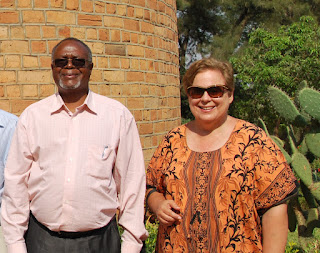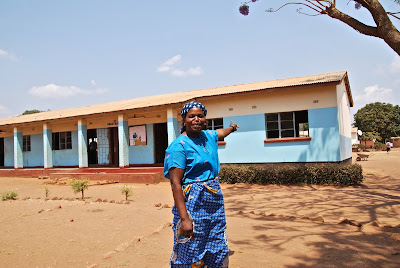
During the 1920s the British government asked Victor Murray
to go to Africa and visit various schools in the colonies. He wrote a book called School in the Bush documenting his
findings. While the British looked down on the Africans, thinking their vernacular
was too simplistic to understand complex concepts and thus needed to learn
English, Mr. Murray saw the complexities of their languages and culture and
argued for allowing them to be taught in both English and the local language. The
term “the bush” is sometimes still used today meaning the rural area or
village. Yesterday I began my
visits to the CCAP community schools in Eastern Province out by the Malawi border.
As we bounced along dirt roads in
our mini-van looking out at the brick and clay houses still made by hand, I
thought about Victor Murray and how much has changed and how much looks much
the same. At times I feel a bit
like Mr. Murray straddling my American culture while trying to understand the
various nuances of the Zambian culture.
 |
| Dr. Chilenje and Nancy Collins |
Wednesday morning we left Lusaka around 6 am and started off
for Lundazi in Eastern Province.
The trip takes all day (12+ hours). We were able to watch the sun rise and set in the same day
while traveling in the car. My traveling companions included Nancy, the PCUSA
Mission Co-worker whom Bob and I have known since 2011, Dr. Chilenje,
professor, minister, and Synod of Zambia moderator, Dr. Karl Klontz and soon to be
med student, Shane. Karl and Shane
are here to install a solar system at Chesefu Seminary.
 |
| The solar instillation team: Karl, Shane and Rev. Zimba |
 |
| The education team |
My friend and recently appointed coordinator of the
community schools for CCAP, Mabuchi, is also here from Lusaka. She and I are visiting schools and reporting
to the Synod. While the rest of
the group from Lusaka headed to Chesefu (about 45 minutes from here) Mabuchi
and I met our hosts, Rev. Nehemiah and Moffat Zulu and started off visiting
schools. Each school has at least
one teacher that has had training from me while the rest of the teachers are
new. Some of the teachers are
government school teachers assigned to community schools as a way to support
learning in rural Zambia. Like
their counterparts in Lusaka, the community schools in Eastern Province
struggle to find adequate supplies, pay their teachers, and encourage the
children to attend school regularly. Unlike Lusaka, the schools here receive
more help from the government and thus have more resources. There is also an acceptance of the practice
of marrying off ones young teenage daughter in exchange for a cow or other
payment, known as “early marriage.”
Some girls as young as 13 or 14 are married off, get pregnant, and never
return to school. In many villages
this is an accepted practice.
 |
| Mr. Nyirenda models using a 100s chart for double digit addition |
During the past two days we visited seven schools. Six of
the schools have had training from me (and my colleagues) in the past. At least one teacher at each school
still remains from 2013. As is the
case in Lusaka, many of the strongest teachers have moved on and are no longer
teaching. Only a few teachers are
continuing the practices they were taught. There is much work to be done.
 |
| Children wanting a closer look at the "mazungu" who is visiting their village |
 |
These teachers practice multi-grade teaching quite effectively
|
 |
| Log entry from Rebecca and my visit in 2013 - Rebecca, did you write this? |
 |
Mabuchi points out her 7th grade classroom
|









No comments:
Post a Comment